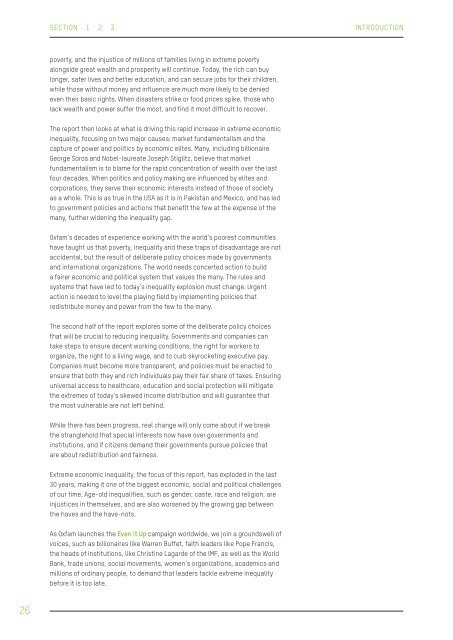1FW2e8F
1FW2e8F
1FW2e8F
Create successful ePaper yourself
Turn your PDF publications into a flip-book with our unique Google optimized e-Paper software.
SECTION 1 2 3 INTRODUCTION<br />
poverty, and the injustice of millions of families living in extreme poverty<br />
alongside great wealth and prosperity will continue. Today, the rich can buy<br />
longer, safer lives and better education, and can secure jobs for their children,<br />
while those without money and influence are much more likely to be denied<br />
even their basic rights. When disasters strike or food prices spike, those who<br />
lack wealth and power suffer the most, and find it most difficult to recover.<br />
The report then looks at what is driving this rapid increase in extreme economic<br />
inequality, focusing on two major causes: market fundamentalism and the<br />
capture of power and politics by economic elites. Many, including billionaire<br />
George Soros and Nobel-laureate Joseph Stiglitz, believe that market<br />
fundamentalism is to blame for the rapid concentration of wealth over the last<br />
four decades. When politics and policy making are influenced by elites and<br />
corporations, they serve their economic interests instead of those of society<br />
as a whole. This is as true in the USA as it is in Pakistan and Mexico, and has led<br />
to government policies and actions that benefit the few at the expense of the<br />
many, further widening the inequality gap.<br />
Oxfam’s decades of experience working with the world’s poorest communities<br />
have taught us that poverty, inequality and these traps of disadvantage are not<br />
accidental, but the result of deliberate policy choices made by governments<br />
and international organizations. The world needs concerted action to build<br />
a fairer economic and political system that values the many. The rules and<br />
systems that have led to today’s inequality explosion must change. Urgent<br />
action is needed to level the playing field by implementing policies that<br />
redistribute money and power from the few to the many.<br />
The second half of the report explores some of the deliberate policy choices<br />
that will be crucial to reducing inequality. Governments and companies can<br />
take steps to ensure decent working conditions, the right for workers to<br />
organize, the right to a living wage, and to curb skyrocketing executive pay.<br />
Companies must become more transparent, and policies must be enacted to<br />
ensure that both they and rich individuals pay their fair share of taxes. Ensuring<br />
universal access to healthcare, education and social protection will mitigate<br />
the extremes of today’s skewed income distribution and will guarantee that<br />
the most vulnerable are not left behind.<br />
While there has been progress, real change will only come about if we break<br />
the stranglehold that special interests now have over governments and<br />
institutions, and if citizens demand their governments pursue policies that<br />
are about redistribution and fairness.<br />
Extreme economic inequality, the focus of this report, has exploded in the last<br />
30 years, making it one of the biggest economic, social and political challenges<br />
of our time. Age-old inequalities, such as gender, caste, race and religion, are<br />
injustices in themselves, and are also worsened by the growing gap between<br />
the haves and the have-nots.<br />
As Oxfam launches the Even it Up campaign worldwide, we join a groundswell of<br />
voices, such as billionaires like Warren Buffet, faith leaders like Pope Francis,<br />
the heads of institutions, like Christine Lagarde of the IMF, as well as the World<br />
Bank, trade unions, social movements, women’s organizations, academics and<br />
millions of ordinary people, to demand that leaders tackle extreme inequality<br />
before it is too late.<br />
26


